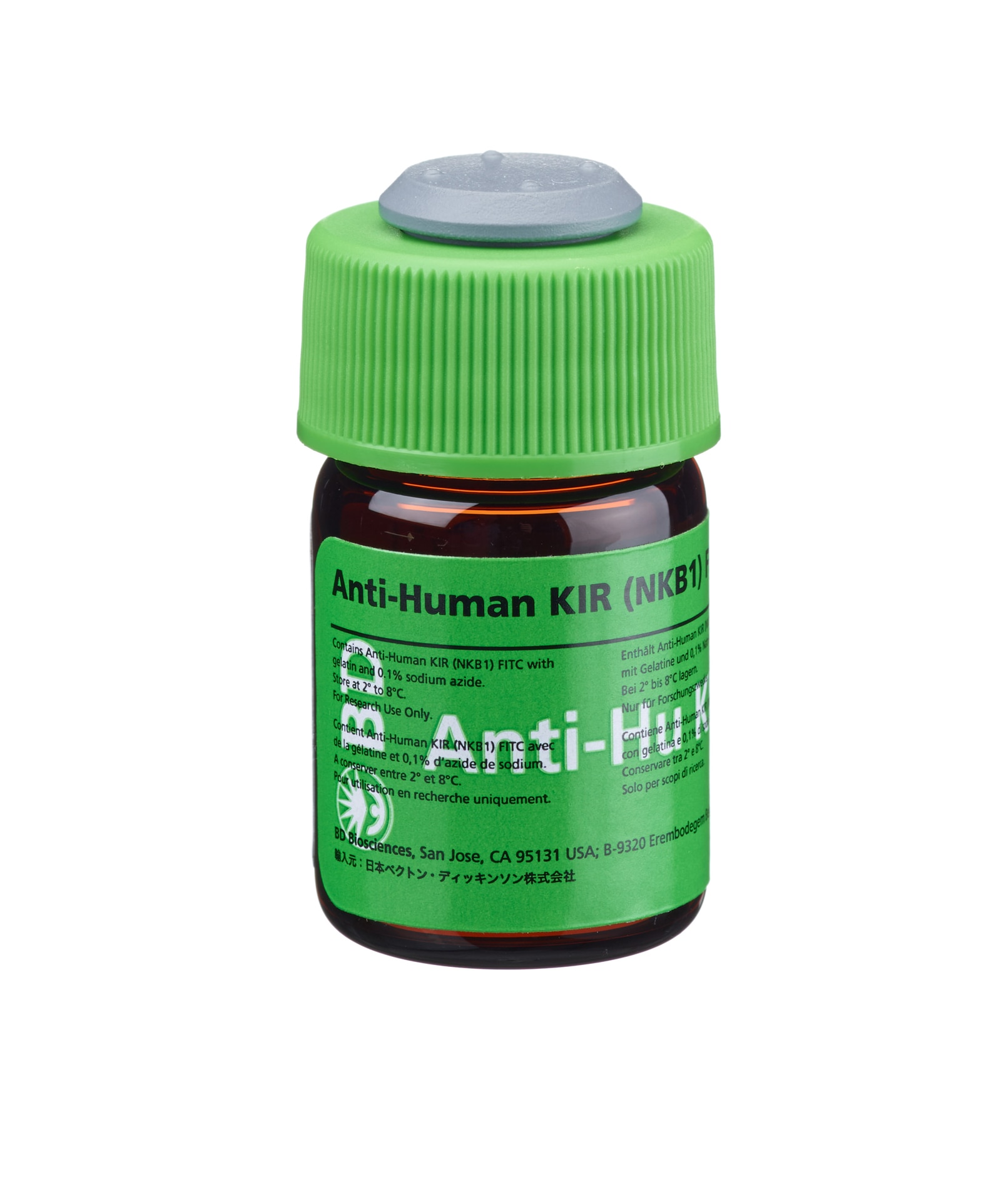-
Your selected country is
Middle East / Africa
- Change country/language
Old Browser
This page has been recently translated and is available in French now.
Looks like you're visiting us from {countryName}.
Would you like to stay on the current country site or be switched to your country?


Regulatory Status Legend
Any use of products other than the permitted use without the express written authorization of Becton, Dickinson and Company is strictly prohibited.
Preparation And Storage
Store vials at 2°C–8°C. Conjugated forms should not be frozen. Protect from exposure to light. Each reagent is stable until the expiration date shown on the bottle label when stored as directed.
The DX9 monoclonal antibody specifically binds to CD158e1, also known as NKB1. CD158e1 functions as a killer cell inhibitory receptor (KIR) and is encoded by KIR3DL1 (Killer cell immunoglobulin-like receptor, three domains, long cytoplasmic tail). CD158e1 is a 70 kDa glycoprotein that belongs to the Ig superfamily. It is expressed on a subset of natural killer cells and a small subset of T cells. Expression of CD158e1 has been observed to vary among individuals. KIR molecules specifically recognize a certain group of HLA class I antigens. Interaction of CD158e1 with specific HLA-B antigen on a target cell appears to inhibit cell-mediated cytotoxicity by delivering a negative signal that prevents lymphocyte activation. It is suggested that this MHC class I-KIR interaction works as a signaling mechanism that regulates NK and T-cell responses to antigenic challenge.

Development References (11)
-
Centers for Disease Control. Perspectives in disease prevention and health promotion update: universal precautions for prevention of transmission of human immunodeficiency virus, hepatitis B virus, and other bloodborne pathogens in health-care settings. MMWR. 1988; 37:377-388. (Biology).
-
Clinical and Laboratory Standards Institute. 2005. (Biology).
-
Colonna M, Samaridis J. Cloning of immunoglobulin-superfamily members associated with HLA-C and HLA-B recognition by human natural killer cells. Science. 1995; 268(5209):405-408. (Biology). View Reference
-
D'Andrea A, Chang C, Franz-Bacon K, McClanahan T, Phillips JH, Lanier LL. Molecular cloning of NKB1. A natural killer cell receptor for HLA-B allotypes. J Immunol. 1995; 155(5):2306-2310. (Biology). View Reference
-
Gumperz JE, Litwin V, Phillips JH, Lanier LL, Parham P. The Bw4 public epitope of HLA-B molecules confers reactivity with natural killer cell clones that express NKB1, a putative HLA receptor. J Exp Med. 1995; 181(3):1133-1144. (Biology). View Reference
-
Gumperz JE, Valiante NM, Parham P, Lanier LL, Tyan D. Heterogeneous phenotypes of expression of the NKB1 natural killer cell class I receptor among individuals of different human histocompatibility leukocyte antigens types appear genetically regulated, but not linked to major histocompatibility complex haplotype. J Exp Med. 1996; 183:1817-1827. (Biology).
-
Lanier LL, Gumperz JE, Parham P, Melero I, López-Botet M, Phillips JH. The NKB1 and HP-3E4 NK cells receptors are structurally distinct glycoproteins and independently recognize polymorphic HLA-B and HLA-C molecules. J Immunol. 1995; 154(7):3320-3327. (Biology). View Reference
-
Lanier LL, Phillips JH. Inhibitory MHC class I receptors on NK cells and T cells. Immunol Today. 1996; 17:86-91. (Biology).
-
Litwin V, Gumperz J, Parham P, Phillips JH, Lanier LL. NKB1: a natural killer cell receptor involved in the recognition of polymorphic HLA-B molecules. J Exp Med. 1994; 180(2):537-543. (Biology). View Reference
-
Litwin V, Gumperz JE, Parham P, Phillips JH, Lanier LL. Specificity of HLA class I antigen recognition by human NK clones: Evidence for clonal heterogeneity, protection by self and non-self alleles, and influence of the target cell type. J Exp Med. 1994; 180:537. (Biology).
-
Phillips JH, Gumperz JE, Parham P, Lanier LL. Superantigen-dependent, cell-mediated cytotoxicity inhibited by MHC class I receptors on T lymphocytes. Science. 1995; 268:403-405. (Biology).
Please refer to Support Documents for Quality Certificates
Global - Refer to manufacturer's instructions for use and related User Manuals and Technical data sheets before using this products as described
Comparisons, where applicable, are made against older BD Technology, manual methods or are general performance claims. Comparisons are not made against non-BD technologies, unless otherwise noted.
For Research Use Only. Not for use in diagnostic or therapeutic procedures.
Although not required, these products are manufactured in accordance with Good Manufacturing Practices.
Report a Site Issue
This form is intended to help us improve our website experience. For other support, please visit our Contact Us page.